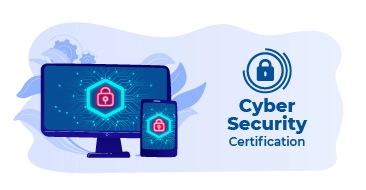
Cybersecurity professionals are in high demand as we have submerged ourselves in the technological era. With the emergence of new vulnerabilities, the cyber attack surface has dramatically expanded. Hence, every organization implements cybersecurity to deal with technologies, data, networks, and programs.
As a company that deals with critical data and networks, you must see that your IT team is fully equipped with cybersecurity certification and experience. Cybersecurity jobs are plentiful in demand, but each candidate must have proof of solid cybersecurity skills. Therefore, you have landed here to see for yourself which certifications can help boost your career.
Cyber Security is layers of protection of systems connected to the internet such as hardware, software, and data. It is a practice of defending the servers, networks, and data from malicious attacks. With the use of creative methods and technologies, cybersecurity professionals protect the confidentiality and integrity of computer systems from unauthorized access.
A cybersecurity professional must attain problem-solving skills, analytical skills, technical aptitude, attention to detail, fundamental and advanced knowledge of computer security and forensics, etc. Cybersecurity Courses can lead you to a path where you can advance your skills and expertise to gain career growth. With proper certification, you can kickstart your professional career in cybersecurity.
Read Also: Reasons Why Cybersecurity Is Important Now
There are quite a few certifications that focus on network and data protection on different levels. Each certificate prepares you, aspirants, for the future of cybersecurity and to explore diverse areas of cybersecurity. Having a targeted career goal in mind, steer towards these best cybersecurity certifications.
EC-Council offers the Certified Ethical Hacking (CEH) Certification to bring the mentality of ethical hacking, also known as white hat hacking, which will help get into malicious hackers' minds. In addition, the CEH demonstrates the moral actions of penetration testing, attack detectors, vectors, and prevention.
The CEH Certification helps you to think like a hacker, through which you can scan, test, and protect the possible vulnerabilities of a company server or network. In addition, it teaches you about the latest malware, viruses and openness, and information security laws.
CEH students go through real-life scenarios where they are exposed to different hacking techniques. Then, with rigorous training, students will master ethical hacking skills like how to think like hackers to protect the systems from possible malware attacks.
Read Also: How to Become a Certified Ethical Hacker?
CompTIA Security+ is a global entry-level security certification that employs a general cybersecurity role. It validates your core skills and abilities to access an organization’s cybersecurity, monitor, and secure certified Ethical Hacker (CEH) their servers from risks and violations.
The CompTIA Security+ certificate is subjected to CompTIA certifications career path and caters to IT security knowledge that covers:
Read Also: Benefits of CompTIA Security+ Certification
The Certified Information Security Manager (CISM) certification is one of the best expertise-level certifications formed by ISACA (Information Systems Audit and Control Association). It specifically focuses on information security governance, risk management, incident management, and program development.
You must have at least five years of proven cybersecurity experience in information security management. The CISM certification is meant for those aspirants interested in managing enterprise information security. In addition, it would increase earning potential for information security managers, prospective managers, and IT consultants who support infosec program management.
Read Also: Highest Paying Cyber Security Jobs
ISACA’s Certified in Risk and Information System Control (CRISC) certification is one of the most pursued cybersecurity certifications. It indicates the expertise in identifying and managing enterprise IT risk. The accreditation ensures the professional’s ability to conduct a thorough risk assessment at an enterprise level.
CRISC enables professionals to extend their knowledge in IT risk identification and management, business risk, and implementation of business systems control. Business analysts, chief information officers (CIO), project managers, and other IT professionals with a minimum of three years of experience can pursue CRISC certification.
Certified Information Systems Security Professionals (CISSP) is an essential requirement by many IT companies for network security. The certification validates your skills in access control systems, cryptography, telecommunications, and networking.
The CISSP requires at least three to five years of field experience as a security analyst, systems engineer, or two of the eight domains. These include security and risk management, asset security, security architecture and engineering, communication and network security, identity and access management, security assessment and testing, security operations, and software development security. There are several benefits of CISSP Certification.The CISSP Certification is essential for a long-term career in cybersecurity, where you will always stay at the forefront of technology trends that emerge around the globe every day.
Read Also: How to Become a Certified Information Systems Security Professional?
ISACA’s Certified Information Systems Auditor (CISA) certification focuses on information auditing and validates experience for technicians that audit IT and business systems. It covers domains such as the information systems auditing process, protection of information assets, IT governance and management, information systems operations and business resilience, acquisition, development, and implementation.
The CISA is designed for mid-level IT professionals that desire to advance into their career with at least five years of prior experience in IT, IS audit, control, security, or assurance.
Read Also: Top In-Demand Cybersecurity Skills
The GSEC from Global Information Assurance Certification (GIAC) is an entry-level credential for those aspirants who wish to occupy hands-on security roles concerning security tasks. It requires you to have a background in information systems and networking.
The GSEC credential validates your skills in cryptography fundamentals, network security, active defence, password management, defensible network architecture, cloud security, etc. In addition, the certification covers information security program development, management, incident management, risk management, and compliance.
The Systems Security Certified Practitioner (SSCP) certificate ensures your advanced technical skills to design, implement, monitor and administer IT infrastructure using the best security practices and procedures. The SSCP creates a benchmark in your career as an IT administrator, manager, and network security professionals.
To attain the SSCP credential, the candidate must have at least one year of work experience in one or more testing areas. The certification tests your expertise in risk identification, security administration, cryptography, application security, incident response, and communications.
Read Also:The Future of Cybersecurity
The Certified Cloud Security Professional (CCSP) certification ensures that the IT professionals have the skills and knowledge about cloud security architecture, design, implementation, operations, and services.
CCSP is designed for cloud security professionals with extensive experience of five years in information technology, IT architecture, governance, cloud, and web security engineering. The certification covers cloud architecture and design concepts, cloud data and security, cloud operations, legal and compliance.
Issued by Global Information Assurance Certification, GCIH validates your ability to manage incident operations that include attack techniques and vectors. In addition, it ensures your skill against defending and responding to security attacks when or if they occur.
The GCIH certification covers incident handling, computer crime investigation, hacker exploits, and hacker tools. You will achieve the credential quickly if you have prior knowledge of security principles, networking protocols, and the Windows Command-Line.
Read Also: How to Become a Cyber Security Professional?
To Conclude
Earning prominent cybersecurity certification can upscale your career as it validates your skills and knowledge. However, it would be best if you created a clear career path before attaining certification and enforcing yourself with the roles of cybersecurity professionals. By considering your experience, area of focus, and potential employers, you will choose a suitable certificate. You can start your career as a regular IT professional and then pave your path into a cybersecurity professional.
Read Also: CISSP Certified Professional Jobs and Salary
Here is the list of other major locations where Edoxi offers Cyber Security Courses
Cyber Security Courses in Qatar | Cyber Security Courses in Muscat| Cyber Security Courses in Sharjah | Cyber Security Courses in Dubai |

SENIOR TRAINER: NETWORKING AND PROGRAMMING
Jon Baleva is an IT professional with 20 years of experience in programming and networking. He is an expert in Python & IT Security domains as well as in Operating Systems (OS). He has trained professionals and students in IT Programming courses, Microsoft Azure, Linux & MAC OS. He is also a writer who writes on tech-related topics for various tech magazines in Philippine. He is now an IT Trainer with Edoxi Training Institute, Dubai.
